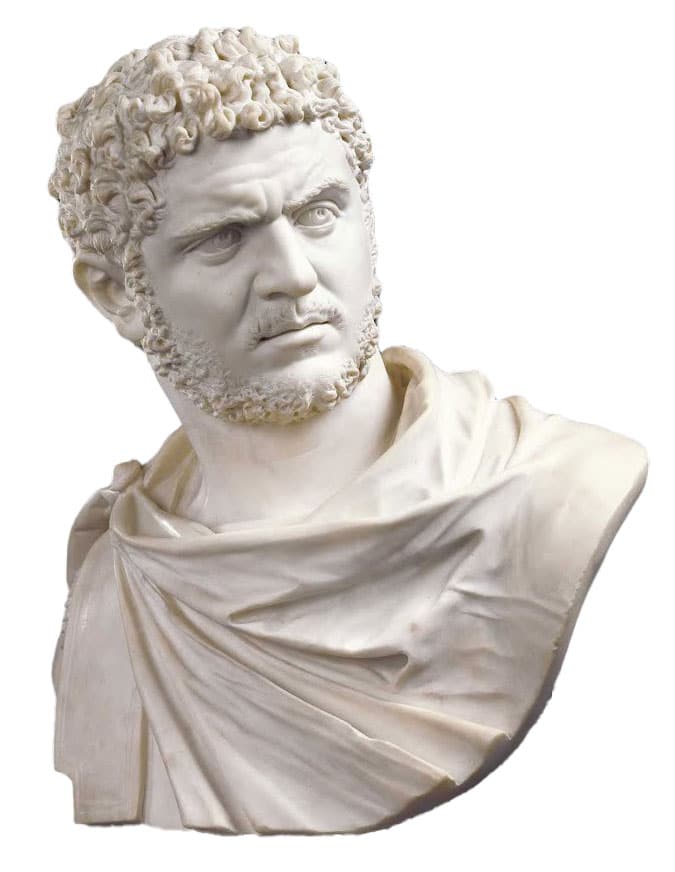
Life: AD 188 – 217
- Name: Lucius Septimius Bassianus
- Born on 4 April AD 188 at Lugdunum (Lyons).
- Consul AD 202, 205, 208, 213.
- Became co-emperor on 4 February AD 211.
- Wife: Publia Fulvia Plautilla.
- Died near Sirmium, 8 April AD 217.
Early Life
Caracalla was born on 4 April AD 188 in Lugdunum (Lyons), being named Lucius Septimius Bassianus. His last name was given to him in honor of the father of his mother, Julia Domna, Julius Bassianus, high priest of the Sun God El-Gabal at Emesa. The nickname Caracalla was given to him, as he tended to wear a long Gallic cloak of that name.
Becoming a Junior Emperor
In AD 195, his father, emperor Septimius Severus, declared him Caesar (junior emperor), changing his name to Marcus Aurelius Antoninus. This announcement should spark off a bloody conflict between Severus and Clodius Albinus, the man who had been named Caesar previously.
With Albinus defeated at the battle of Lugdunum (Lyons) in February AD 197, Caracalla was made co-Augustus in AD 198. In AD 203-4, he visited his ancestral North Africa with his father and brother. Then, in AD 205, he was consul alongside his younger brother Geta, with whom he lived in bitter rivalry.
Brothers Rivalry
From AD 205 to 207, Severus had his two quarrelsome sons live together in Campania, in his own presence, in order to try and heal the rift between them. However, the attempt clearly failed. In AD 208, Caracalla and Geta left for Britain with their father to campaign in Caledonia. With his father ill, much of the command lay with Caracalla.
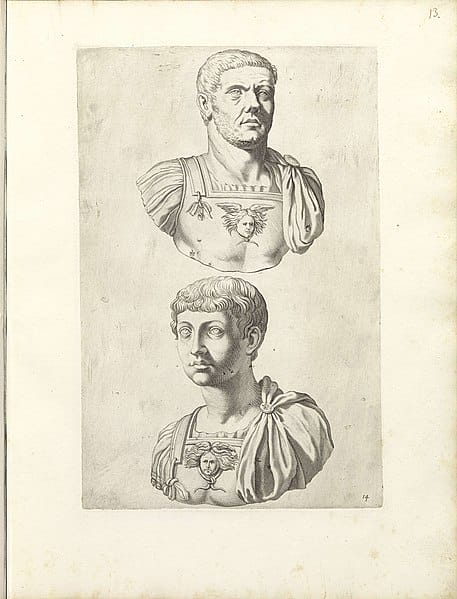
When on a campaign, Caracalla was said to have been eager to have seen the end of his sick father. There is even a story of him trying to stab Severus in the back while the two were riding ahead of the troops. This, however, seems very unlikely. Knowing Severus’ character, Caracalla would not have survived such failure. However, a blow was dealt to Caracalla’s aspirations when, in AD 209, Severus also raised Geta to the rank of Augustus. Evidently, their father intended them to rule the empire together.
Death of Septimius Severus
Septimius Severus died in February AD 211 at Eburacum (York). On his deathbed, he famously advised his two sons to get on with each other, to pay the soldiers well, and not to care about anyone else. The brothers, though, should have a problem following the first point of that advice. Caracalla was 23, and Geta was 22 when their father died. And felt such hostility towards each other that it bordered on outright hatred.
Caracalla’s Attempt on Seizing Power
Immediately after Severus’ death, there appeared to have been an attempt by Caracalla to seize power for himself. Whether this was truly an attempted coup is unclear. Far more, it appears Caracalla tried to secure power for himself by outright ignoring his co-emperor.
He conducted the resolution of the unfinished conquest of Caledonia by himself. He dismissed many of Severus’ advisors who would have sought to also support Geta, following Severus’ wishes. Such initial attempts at ruling alone were clearly meant to signify that Caracalla ruled, whereas Geta was emperor purely by name (a little like emperors Marcus Aurelius and Verus had done earlier).
Geta’s and Caracalla’s Joint Rule
Geta, however, would not accept such attempts. Neither would his mother, Julia Domna. And it was she who forced Caracalla to accept the joint rule. With the Caledonian campaign at an end, the two then headed back for Rome with the ashes of their father. The voyage back home is noteworthy, as neither would even sit at the same table with the other for fear of poisoning.
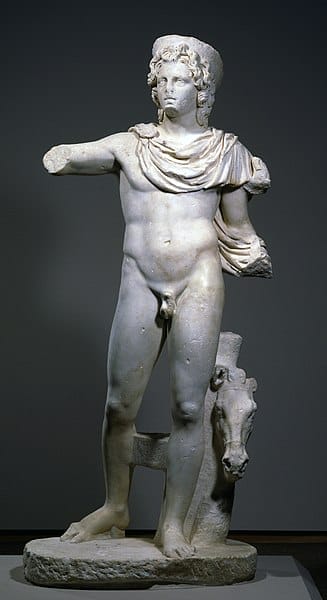
Back in the capital, they tried to live alongside each other in the imperial palace. Yet, so determined were they in their hostility that they divided the palace into two halves with separate entrances. The doors which might have connected the two halves were blocked. More so, each emperor surrounded himself with a large personal bodyguard.
Fight for the Senate
Each brother sought to gain the favor of the senate. Either one sought to see his own favorite appointed to any official office that might become available. They also intervened in court cases in order to help their supporters. Even at the circus games, they publicly backed different factions. Worst of all, attempts apparently were made from either side to poison the other.
Their bodyguards were in a constant state of alert, both living in everlasting fear of being poisoned, Caracalla and Geta came to the conclusion that their only way of living as joint emperors was to divide the empire. Geta would take the east, establishing his capital at Antioch or Alexandria, and Caracalla would remain in Rome.
The scheme might have worked. But Julia Domna used her significant power to block it. It is possible that she feared that if they separated, she could no longer keep an eye on them. Most likely, though, she realized that this proposal would lead to an outright civil war between East and West.
Caracallas Assassination of Geta
Alas, in late December AD 211, he pretended to seek to reconcile with his brother and so suggested a meeting in the apartment of Julia Domna. Then, as Geta arrived unarmed and unguarded, several centurions of Caracalla’s guards broke through the door and cut him down. Geta died in his mother’s arms.
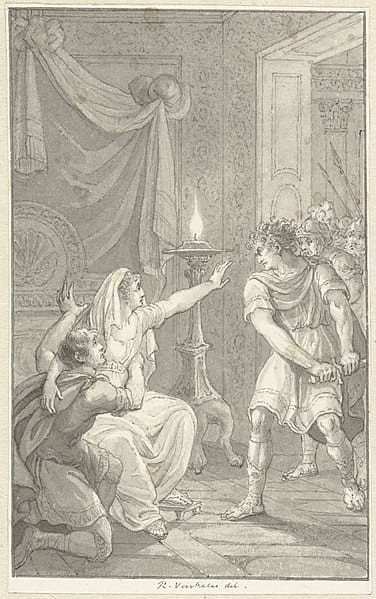
What, other than hate, drove Caracalla to the murder is unknown. Known as an angry, impatient character, he perhaps simply lost patience. On the other hand, Geta was the more literate of the two, often surrounded by writers and intellects. It is, therefore, well likely that Geta was making more of an impact with senators than his tempestuous brother.
Perhaps even more dangerous to Caracalla, Geta was showing a striking facial similarity to his father, Severus. Had Severus been very popular with the military, Geta’s star might have been on the rise with them, as the generals believed they detected their old commander in him. Hence, one could speculate that perhaps Caracalla opted to murder his brother once he feared Geta might prove the stronger of the two of them.
Dealing with Praetorians
Many of the praetorians didn’t feel at all comfortable with the murder of Geta. They remembered that they had sworn allegiance to both emperors. Caracalla, though, knew how to win their favor. He paid each man a bonus of 2’500 denarii and raised their ration allowance by 50%. If this won over the praetorians, then a pay rise from 500 denarii to 675 (or 750) denarii to the legions assured him of their loyalty.
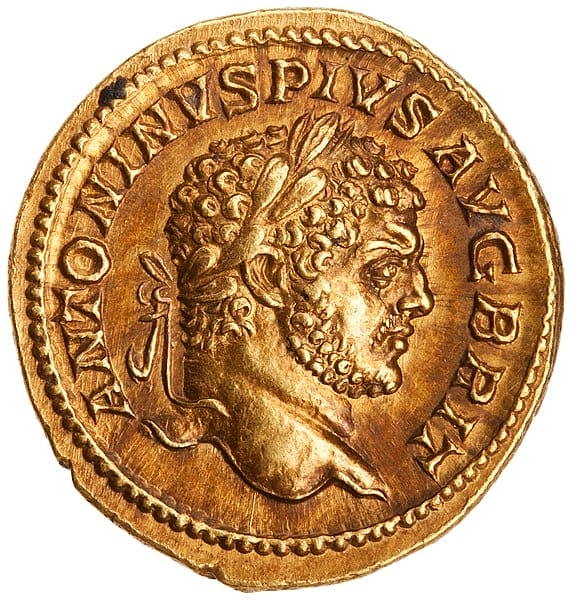
Caracalla’s Vengance
Further to this, Caracalla then began hunting down any supporters of Geta. Up to 20’000 are believed to have died in this bloody purge. Friends of Geta, senators, equestrians, a praetorian prefect, leaders of the security services, servants, provincial governors, officers, ordinary soldiers – even charioteers of the faction Geta had supported; all fell victim to Caracalla’s vengeance.
Suspicious of the military, Caracalla also now rearranged the way legions were based in the provinces so that no single province would be host to more than two legions. Clearly, this made revolt by provincial governors much more difficult.
Caracalla’s Reforms
However harsh, Caracalla’s reign should not only be known for its cruelty. He reformed the monetary system and was an able judge when hearing court cases. But first and foremost of his acts is one of the most famous edicts of antiquity, the Constitutio Antoniniana. By this law, issued in AD 212, everyone in the empire, with the exception of slaves, was granted Roman citizenship.
Campaign in the North
Then, in AD 213, Caracalla went north to the Rhine to deal with the Alemanni, who were once more causing trouble in the Agri Decumates, the territory covering the springs of the Danube and Rhine. It was here that the emperor showed a remarkable touch in winning the sympathy of the soldiers. Naturally, his pay rises had made him popular, but when with the troops, he marched on foot among the ordinary soldiers, ate the same food, and even ground his own flour with them.
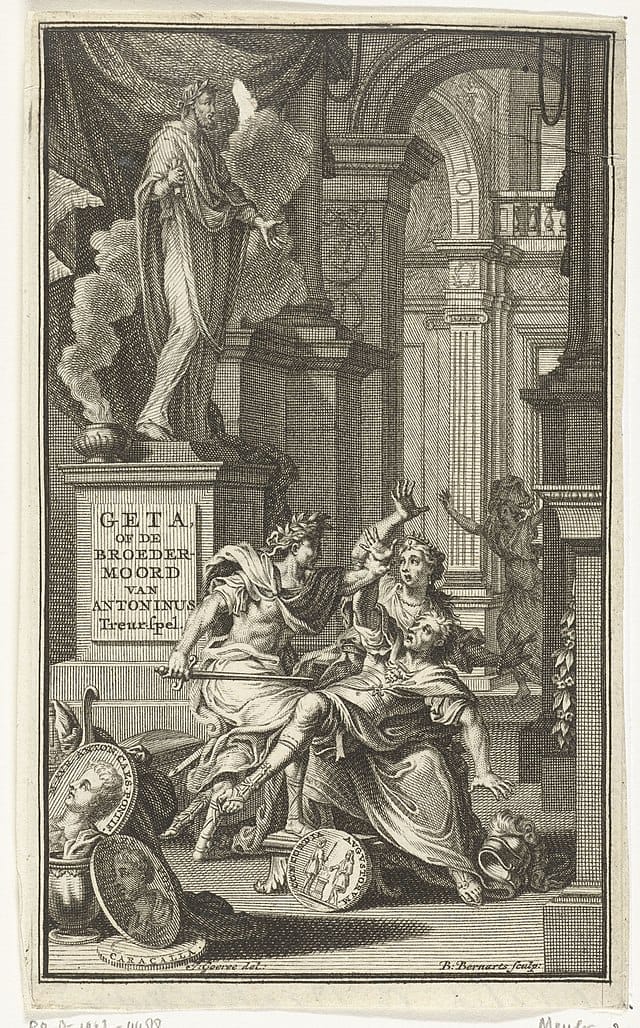
The campaign against the Alemanni was only a limited success. Caracalla defeated them in battle near the river Rhine but failed to win a decisive victory over them. And so he chose to change tactics and instead sued for peace, promising to pay the barbarians an annual subsidy.
Other emperors would have paid dearly for such a settlement. To buy the opponent off was largely seen to be a humiliation for the troops. (Emperor Alexander Severus was killed by mutinous troops in AD 235 for the same reason.) But it was Caracalla’s popularity with the soldiers that allowed him to get away with it.
Becoming a Delusional Leader
In AD 214, Caracalla then headed east, through Dacia and Thrace to Asia Minor (Turkey). It was at this point that the emperor began to have delusions of being Alexander the Great. Gathering an army as he passed through the military provinces along the Danube, he reached Asia Minor at the head of a large army. One part of this army was a phalanx consisting of 16’000 men in the armor of the style of Alexander’s Macedonian soldiers. The force was also accompanied by many war elephants.
Statues of Alexander were ordered to be sent back home to Rome. Pictures were commissioned, which bore a face that was half Caracalla, half Alexander. Because Caracalla believed that Aristotle had had some part in Alexander’s death, Aristotelian philosophers were persecuted.
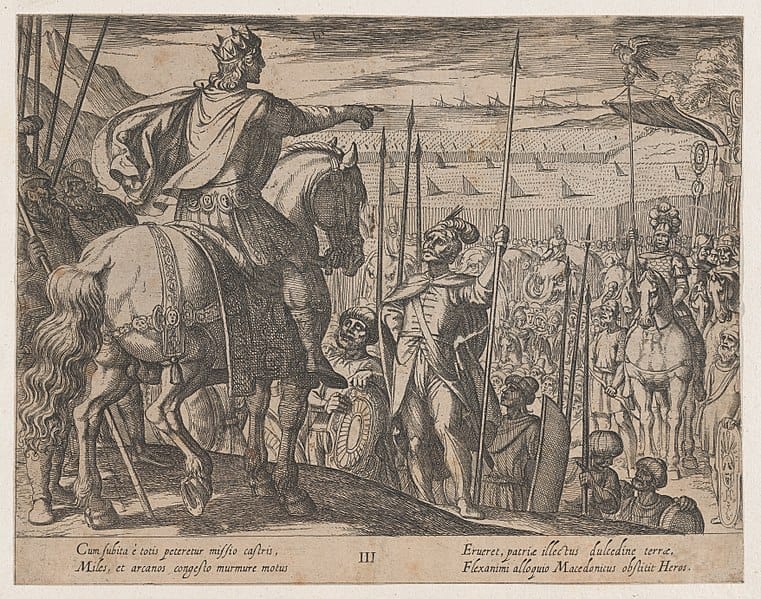
The winter of AD 214/215 was passed at Nicomedia. In May AD 215, the force reached Antioch in Syria. Most likely leaving his great army behind at Antioch, Caracalla now went on to Alexandria to visit the tomb of Alexander. It is not known what precisely occurred next in Alexandria, but somehow Caracalla grew enraged. He set the troops which were with him on the people of the city, and thousands were massacred in the streets.
War Against Parthia
After this gruesome episode in Alexandria, Caracalla headed back to Antioch, where in AD 216, no fewer than eight legions were waiting for him. With these, he now attacked Parthia, which was preoccupied with a bloody civil war. The frontiers of the province of Mesopotamia were pushed further east. Attempts, though, to overrun Armenia failed. Instead, Roman troops marauded across the Tigris into Media and then finally withdrew to Edessa to spend the winter there.
Parthia was weak and had little with which it could respond to these attacks. Caracalla sensed his chance and planned further expeditions for the next year, most likely hoping to make some permanent acquisitions to the empire. Though, it was not to be.
Death of Emperor Caracalla
The emperor might have enjoyed popularity with the army, but the rest of the empire still hated him. It was Julius Martialis, an officer in the imperial bodyguard, who murdered the emperor on a voyage between Edessa and Carrhae when he relieved himself out of sight from the other guards.
Martialis himself was killed by the emperor’s mounted bodyguard. But the mastermind behind the murder was the commander of the praetorian guard, Marcus Opelius Macrinus, the future emperor. Caracalla was only 29 at his death. His ashes were sent back to Rome, where they were laid to rest in the Mausoleum of Hadrian. He was deified in AD 218.
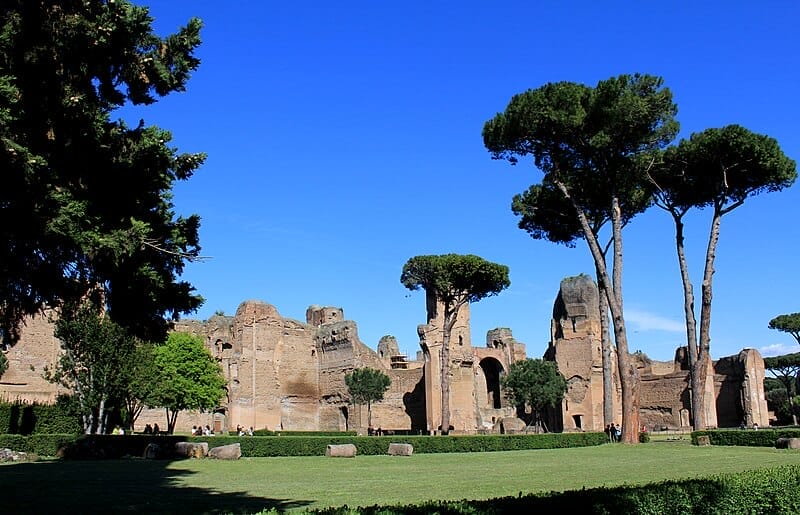
People Also Ask:
What was emperor Caracalla known for?
His principal achievements were his colossal baths in Rome and his edict of 212, giving Roman citizenship to all free inhabitants of the empire. Caracalla, whose reign contributed to the decay of the empire, has often been regarded as one of the most bloodthirsty tyrants in Roman history.
What made Caracalla a bad emperor?
Caracalla, also known as Marcus Aurelius Antoninus, is often considered a bad emperor due to his brutal and tyrannical rule. He is infamous for the massacre of inhabitants in Alexandria, his persecution of political opponents, and the assassination of his own brother, Geta.
Who is Caracalla’s brother?
In 211 CE, while the two were on campaign in Britain along with Caracalla’s brother Geta, Septimius Severus died. At first, Caracalla was co-emperor with his brother Geta. However, this ended in early 212 CE, when Caracalla killed Geta in the arms of their mother.
When was Caracalla assassinated?
On 8 April 217, Caracalla was traveling to visit a temple near Carrhae, now Harran, in southern Turkey, where in 53 BC, the Romans had suffered a defeat at the hands of the Parthians. After stopping briefly to urinate, Caracalla was approached by a soldier, Justin Martialis, and stabbed to death.
Are the Baths of Caracalla still standing?
While only the huge walls and exteriors of the baths are left standing, many of the underground tunnels are still accessible and open to the public, and the interiors are now a large lawn, staging plays, operas, and other theatrical performances.
Who were the most psychopathic Roman emperors?
The true psychopaths were probably Caligula, Nero, Domitian, Caracalla, and Elagabalus. Many of the others (especially from 238 to 284 AD) must have been extremely paranoid. This 76-year period was noted for extremely short reigns.
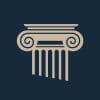
Historian Franco Cavazzi dedicated hundreds of hours of his life to creating this website, roman-empire.net as a trove of educational material on this fascinating period of history. His work has been cited in a number of textbooks on the Roman Empire and mentioned on numerous publications such as the New York Times, PBS, The Guardian, and many more.
